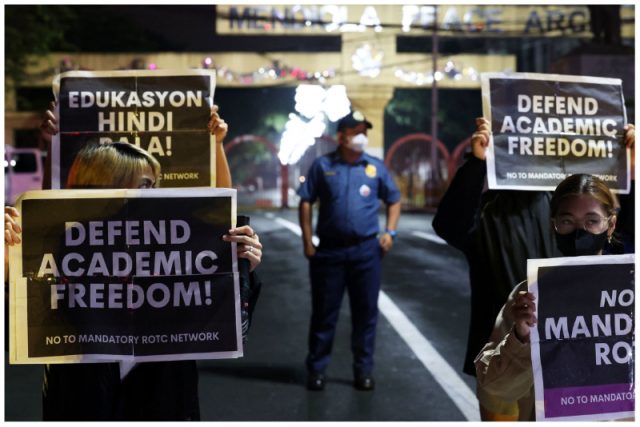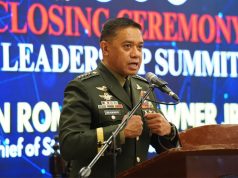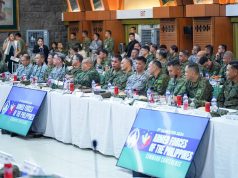
Youth groups opposed the passage of the bill that seeks to require students enrolled in two to four-year undergraduate courses to undergo the National Citizens Service Training Program (NCSTP).
On Thursday, December 15, the House of Representatives overwhelmingly passed the bill on the third and final reading after President Ferdinand Marcos Jr. certified the bill as urgent.
The bill received 276 affirmative votes, while four opposed and one abstained.
RELATED: House approves on third reading bill making NCSTP mandatory
NCSTP will be replacing the current National Service Training Program, while the Reserve Officers’ Training Corps (ROTC) will remain optional.
The House bill said that the two-year training program will focus on disaster risk reduction and management and civic duty-related concerns as a response to the “national and local emergencies, contingencies and disasters, both natural and man-made.”
Meanwhile, the curriculum for the optional ROTC Program will be designed by the Department of National Defense and the Commission on Higher Education.
This program will be administered by the Armed Forces of the Philippines where the “ROTC cadets shall serve as cadet officers and instructors of NCST trainees.”
“Upon completion of NCST, citizen cadets shall be deemed NCST graduates and shall be incorporated in the NSRC (National Service Reserve Corps) and the AFP Reserve Force,” Section 13 of the bill reads.
Militarization
Several youth groups expressed their alarm over the NCSTP bill citing how the program could promote militarization in educational institutions.
“There is also forced conscription under the program as NCST graduates will be incorporated into the AFP reserve force. This also entails further campus militarization in schools that will put the studentry, the faculty, the education support personnel, and the whole education stakeholders at risk of imminent danger,” Rep. Arlene Brosas (Gabriela Partylist) said.
College Editors Guild of the Philippines (CEGP) shared a similar view. It also highlighted how the bill could threaten the freedom of campus journalists and student councils.
“MROTC-NCST is de-facto Martial Law in our schools. This bill gives military forces overwhelming power and authority over students, especially institutions like campus publications and student councils,” CEGP national spokesperson Melanie Feranil said.
“The forced military training and campus militarization under MROTC-NCST give way to unlimited ways to attack our students and our freedoms. Supposed zones of peace universities and colleges are now zones of danger,” she added.
Environmental issues
Samahan ng Progresibong Kabataan (SPARK), meanwhile, said that the NCSTP bill that seeks to mobilize the youth during disaster does not address the real problem, which is environmental concerns.
“The issue is not a matter of lack of manpower or mobilizing capacity of the government to deploy responders. There are more than enough in the military, police force, and various government agencies down to the barangays to provide the manpower,” SPARK said in a statement.
“Even if the government mobilizes its NCST graduates in every national and local emergency, contingencies, and disaster, this would not resolve the problem that the country faces on a bigger scale,” it continued.
The group also stressed the country’s environmental policies and how they affect the lives of Filipinos.
“The issue lies behind the government’s various anti-people and anti-environment policies. They continue to grant permits to industries that destroy the environment such as reinstating mining companies that were suspended for environmental violations, the building of the Kaliwa Dam, the wanton destructive operations of logging and extractive industries, and many other anti-environment policies,” the progressive group said.
RELATED: Why China-funded Kaliwa Dam, a possible alternate water source, is heavily opposed
Education crisis
The group also slammed the bill saying that the NCSTP “directly makes life even harder for students than it already was.”
“Students transition to an unsupported return to face-to-face classes coupled with budget cuts, fare, and dormitory increases, and still unreviewed K to 12 program yet, the government burdens them even more by adding additional units, expenses, and time through the mandatory four-semester NCST program,” SPARK’s statement read.
Under Article X, Section 4 of the bill, “covered HEI (Higher Educational Institutions) and TVIs (Technical Vocational Institutions) may collect a reasonable NCST training fee of not more than fifty percent of the tuition fee per academic unit or subject.”
The NCSTP bill, however, said that students from public HEIs and TVIs are not required to pay additional fees.
“If greater youth participation is what the government wants, it should allow the youth the time and energy to do so by easing their burden in the education sector, not put sectoral participation into the curriculum,” SPARK said.
RELATED: Imposed flexibility or face-to-face? Why CHED’s policy proposal faces some opposition | Crisis in education? Pinoys fret over Philippines’ high learning poverty rate
Suggestions
The youth groups demanded to scrap the NCSTP and suggested addressing the real problems of Filipinos.
“We continue to raise our demands for measures that would actually target the causes of the burdens the Filipino people bear: aggressive taxing of the elite to fund social welfare, education, and environmental spending. A time of deepening crisis is no time for the government to make the people do its job,” SPARK said.
Gabriela Partylist urged the government to promote teaching of History and Filipino subjects to all ages, citing that it could instill and uplift the youth’s sense of nationalism and service to the country.
“We can also expand the National Service Training Program and include a community service program, health, and nutrition program, disaster preparedness program, and human rights education,” it added.









